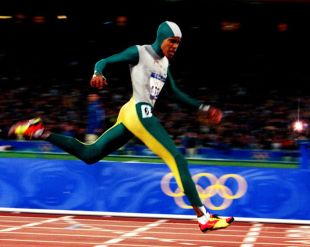- Rewind to 2000
Cathy Freeman lights up Australia
As the Olympic torch makes its way around the UK, we look back to the start of the Millennium, when one particular individual's carrying of the flame stood for far more than the history of the Games...
When Cathy Freeman became the first competing athlete to light the Olympic torch, a nation's expectations of track glory intensified to a level that was unfair on the individual.
"I was always surrounded by expectation from the very first race I ran as a five-year-old," she said, but there was no escaping the fact that the Australian Aboriginal was a symbol of the 2000 Games in Sydney, even if there was bound to be some controversy regarding a subject so emotive as the one relating to her roots.
The identity of who would light the flame at the opening ceremony on September 15 had been a closely-guarded secret. The world watched on as the torch was passed to Freeman, and her link to the Games was already secure, regardless of how she performed. Encircled by flames, the heat really was on if she was to live up to her star billing.
Catherine Astrid Salome Freeman knew the 400m was her real chance of glory, after claiming a silver in Atlanta, even though she also went on to finish sixth in the 200m. Going into the race as favourite and world champion, particularly with Frenchwoman Marie-Jose Perec out of the running, all eyes were on the 27-year-old in the green-and-white bodysuit.
After a steady start, she found herself in contention for gold on the final turn in third place. A superior finishing kick left Lorraine Graham and Britain's Katherine Merry in her wake as she motored to take the title in a time of 49.11sec. In truth, it had never really looked in any doubt.
Immediately removing her hood, Freeman's face was a picture of wide-eyed excitement and a sense of accomplishment as the fans in the stadium celebrated a home victory that mattered more than most. Flashlights from cameras illuminated the scene as 112,000 supporters witnessed sporting history being made.
After sitting on the track to assess the enormity of her achievement, she embarked on a victory lap - proudly carrying both the Aboriginal and Australian flags as she had done many times in the past, even if it had sparked controversy during the 1994 Commonwealth Games in Victoria, Canada.
It should all have been about the glory of outsprinting her rivals and becoming champion but there was an obvious subtext of Aboriginal reconciliation that she cared so passionately about. Hundreds of years of exploitation could hardly be erased by this one shining star of a new Millennium but perhaps Australia could embrace a more unified future.

"People choose to symbolise me for all sorts of causes," explained the North Queenslander. "I just love running and I love competing and that's really simple. I just go out there with a lot of pride in my heart. I know that I not only represent myself but I represent my people. "
Freeman had been the first Aboriginal woman to run for Australia in 1990 at the age of 16 and recognised she was also a torch-bearer for her people.
"I like to typify any young Aboriginal person in Australia today where we're living in a country of unity and enjoying the opportunities that are available here for everybody of all backgrounds, cultures, religious interests, whatever," she stated. "So that's what I'm about, just being free to be who I am in my own home."
A British newspaper interview in which she accused the John Howard government of being insensitive in refusing to apologise for the past and spoke of her grandmother being part of the 'stolen generations', displayed the inner struggle fuelling her bid for success.
There was another driver behind her unshakeable, unrelenting pursuit of gold - the tragic death of her sister Anne-Marie whom so much of the success would be dedicated to.
But Prime Minister Howard admitted his gratitude with warm words on her performance in Sydney. "Her victory was one of the great sporting events of our generation," he said. "I think she's been a wonderful Australian, is a wonderful Australian. I don't think there could be any greater accolade for anybody."
What happened next?
"I had a long chat with her a year after she took gold in Sydney and she just was not the same person. You cannot be after you go through what she went through. Most people are able to adapt their lives to becoming a world-class athlete, but becoming a national icon is another matter." - Former British athlete Steve Cram.

